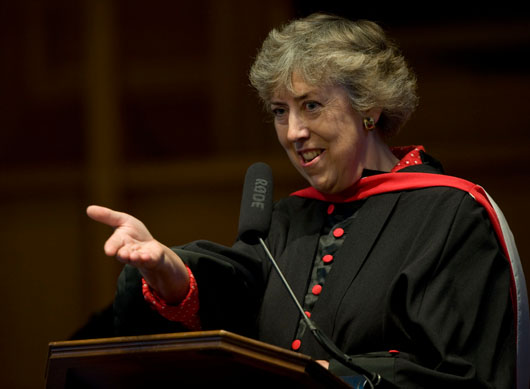Laureation address – Baroness Manningham-Buller

Baroness Manningham-Buller
Honorary Degree of Doctor of Laws
Laureation by Dr Michael Boyle
School of International Relations
Thursday 24 June 2010
Chancellor, it is my privilege to present Baroness Manningham-Buller for the Degree of Doctor of Laws, honoris causa.
Eliza Manningham-Buller is well known in Britain and beyond as the Director General of the Security Service (MI5) during 2002-2007. But it was more than a happy accident that someone so accomplished in the fields of counter-terrorism and intelligence wound up leading the British Security Service in the aftermath of the September 11th attacks. Rather, her service was the culmination of a long and distinguished career of public service.
Eliza Manningham-Buller was educated at Benenden School and read English at Lady Margaret Hall, Oxford. While a student at Oxford, she was chosen to play the Fairy Godmother in Cinderella in the first ever Oxford University Dramatic Society pantomime, in a performance that her peers described as “absolutely superb.” But even at the time Eliza Manningham-Buller knew that a life in the theatre was not for her. She briefly worked as a teacher at the Queen’s Gate School in Kensington before joining the Security Service in 1974.
Early in her career with the Security Service, Eliza Manningham-Buller developed an expertise in counterintelligence and became one of the UK’s leading practitioners of this difficult art. In the early 1980s, she was one of a small number of people who knew that Oleg Gordievsky, the deputy head of the KGB residence in London, was a British agent. Her capacity for tact and secrecy served her well in protecting this key source of information for several years, even from a spy within her own office. Gordievsky himself later credited her and her colleagues with protecting him from discovery by the KGB and saving his life. Later, Eliza Manningham-Buller served as the senior liaison for MI5 in Washington, DC during the first Gulf War.
It is in the field of counter-terrorism where Eliza Manningham-Buller has made perhaps the greatest impact. She led the Security Services investigation into the Lockerbie bombing in 1988. Throughout her career, she developed substantial experience in countering Irish terrorism and in 1992 was appointed to lead the newly-created section to deal with Irish terrorism on the UK mainland. As Director, she was responsible in turn for a wide range of capabilities, including surveillance and technical collection, finance and information technology, and for the overall effort on Irish counterterrorism. Her strong performance as a director for all of these functions led to a promotion as the Deputy Director General in charge of all intelligence operations in 1997.
Eliza Manningham Buller was appointed as the Director General of MI5 in 2002 and led the organization through the difficult period following the September 11th attack. Under her leadership, the Service nearly doubled in size, increased its capacity considerably and opened eight new offices in the UK. Within the Service, she also became well known for her sense of humour and became the first Director General to give a talk to staff entitled “Fun at Work.” But this sense of professional good humour was balanced with a deep commitment to the tasks of her office. She led the Service during a period of organizational expansion and change, as it increased its operations to counter the growing threat posed by groups like al Qaeda.
As Director-General, she played a key role in stimulating public debate about the threat posed by international terrorism. With characteristic precision and sobriety, Eliza Manningham-Buller made clear to a sometimes sceptical public the dimensions of the threat posed by al Qaeda to the United Kingdom. In summer 2004, she warned of the growing threat posed by the radicalization of a very small number of young British Muslims and warned that the UK government could never have enough information to be absolutely certain of disrupting potential terror attacks. She also played a leading role in highlighting the risks posed by chemical, biological, radiological and nuclear (CBRN) terrorism, warning that such an attack was “only a matter of time.”
Her time in office has not been free of controversy or difficult issues. Eliza Manningham-Buller vigorously defended the record of the Security Service during the difficult period which followed the London bombings on 7 July 2005. She reminded the public that the Security Service, while successful at disrupting a number of attacks on the UK mainland, would never be able to stop every attack. She also called for politicians and the public alike to engage in a new debate on the balance between security and civil liberties. These are difficult issues that naturally incite controversy, but her careful and determined attempt to keep the public informed of the reality of the threat and to her call to find a vigorous but careful response provided a vital public service during this tumultuous period.
After retiring from MI5 in 2007, Eliza Manningham Buller has continued to play a leading role in shaping the contemporary debate over counter-terrorism in the UK. In her maiden speech to the House of Lords on 8 July 2008, she criticized the government’s plans to extend the detention period for terrorist suspects from 28 to 42 days. Her intervention in this important debate – which probably led to the government being defeated in the House of Lords – showed her integrity and determination to ensure that civil liberties remain well protected despite the unprecedented seriousness of the contemporary threat from terrorism.
Chancellor, in recognition of her major contribution to international peace and security, I invite you to confer on Baroness Manningham-Buller the Degree of Doctor of Laws, honoris causa.
Category Awards